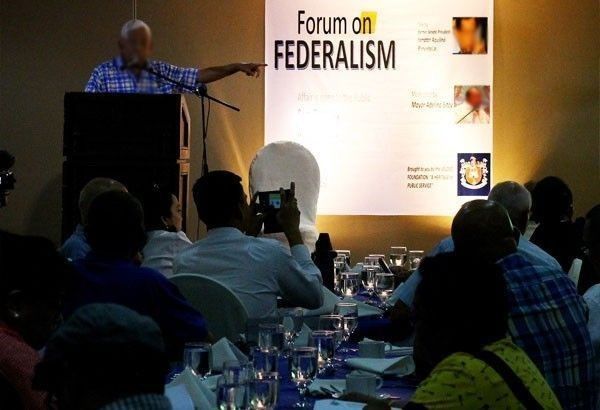Federalism on back burner but not dead – Palace exec

MANILA, Philippines — President Duterte’s call to amend the 1987 Constitution and push for federalism will have to take the back seat because of the stiff challenges it might face from members of the 18th Congress, Secretary to the Cabinet Karlo Alexei Nograles said.
In an interview with “The Chiefs” aired the other night on Cignal TV’s One News, Nograles said the Charter change (Cha-cha) move scored low in the assessment for “ease of passage” when members of the Cabinet reviewed recently the measures under the President’s legislative agenda for the last half of his six-year term.
“Although federalism is part of the legislative agenda, it ranked low in the ease of passage, so we are also trying to be very realistic because we know that we are limited by time. We only have three years left,” he pointed out.
He explained that the Palace assessed every measure in the President’s legislative agenda based on prioritization criteria such as high level of priority, high level of insurgency, advanced legislative agenda and the presence of the administrative counterpart bill.
“The way we classified it, we looked at (these measures) whether they can be passed during the first regular session, the second regular session and the third regular session,” Nograles said.
Duterte, who has campaigned for federalism and stamping out criminality, is now in the second half of his six-year term. He is set to hold a Legislative-Executive Development Advisory Council (LEDAC) next month.
Based on the rating system of Malacañang, Nograles explained federalism might need to hurdle challenges during legislative debates.
“We put federalism as part of the third regular session. We are trying to be realistic that it might pass in the House (of Representatives) but when it gets to the Senate, it might get stuck. The biggest opportunity was in the previous Congress. But because it did not pass in the last Congress, to be realistic about it, it would be more challenging,” he said.
He added that the administration is looking at a two-way track through regular legislation via the approval of the proposed amendments to the Trade Liberalization Act and the Public Services Act.
“If we are not successful in the amendments on the eco provisions of the Constitution, then at least, it will move in ordinary legislation,” he also said.
Although the Palace is “pretty confident” that the measures announced by Duterte in his State of the Nation Address would be passed by Congress, Nograles admitted that “it’s really a case against time here to be practical about it.”
In his SONA, Duterte pushed for the approval of the National Land Use Act, Department of Disaster Resilience, Trabaho bill, Government Right-sizing Bill, Coconut Farmers’ Trust Fund; creation of the Department of Overseas Filipinos, Water Resources Department and the Water Regulatory Commission; institutionalization of the Malasakit Centers, Salary Standardization Law V, Magna Carta for Barangays and Barangay Health Workers; modernization of the Bureau of Fire Protection; expansion of the Solo Parents Act; and the establishment of the National Academy for Sports.
Trabaho bill, part of the government’s tax reform package, has been renamed as Corporate Income Tax Rationalization Act or CITRA.
The proposed measures in the priority legislative agenda also include the postponement of the 2020 barangay elections, military and uniformed personnel pensions bill and the mandatory ROTC.
According to Nograles, the Cabinet and the security, justice and peace cluster (SJPC) are pushing for the amendments to the Human Security Act.
“What was discussed was the strengthening of the Human Security Act. Right now, there are talks that maybe, if we strengthen the Human Security Act, the revival of the Anti-Subversion Law might not be needed anymore,” Nograles said, when asked if the cluster has included the revival of the Anti-Subversion Law.
SJPC is also pushing the approval of archipelagic sea lanes and Philippine maritime zones while the participatory governance cluster is looking at passage of budget modernization bill, freedom of information, and the SSL V.
According to Nograles, the climate adaptation and mitigation cluster covers the measures on land use, disaster department and water resources board.
The human development cluster is looking at passage of anti-elder abuse bill and the Security of Tenure bill, while the economic cluster is working for the passage of the amendments to the Foreign Investments Act, Pubic Service Act and Retail Trade Liberation Act, as well as the excise tax or sin tax.
- Latest
- Trending



























